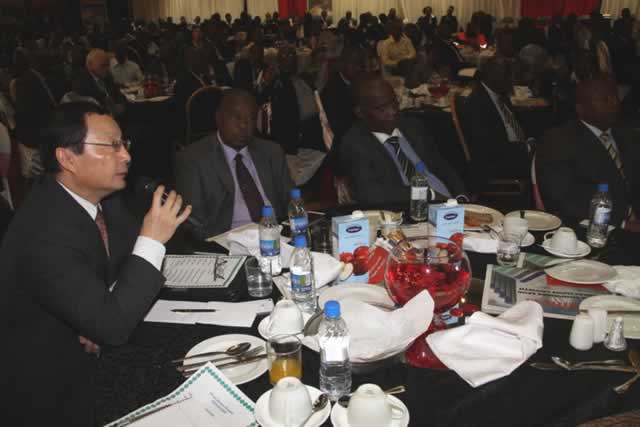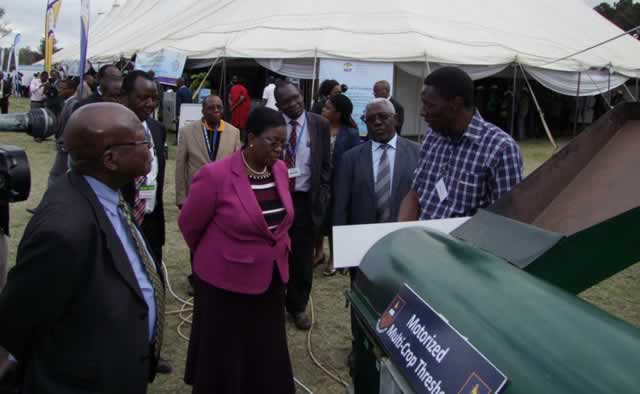‘We’ve not started on parastatals reform’


Chinese Ambassador to Zimbabwe Lin Lin (left) makes a comment on relations between the two countries at the oversubscribed breakfast meeting yesterday, which was hosted by The Herald Business
Business Reporter
THE Government should be ruthless when eradicating corruption in parastatals and when removing deadwood from the leading State enterprises, a senior minister has said.
Parastatals have been the country’s bane, draining the fiscus while failing to perform the functions for which they were set out to do.
Most of the 78 parastatals have been reporting huge losses, putting further strain on Government coffers.
State enterprises such as the National Railways of Zimbabwe, which should play a big role in the revival and growth of the economy, have all but collapsed.
Parastatal bosses have been accused of drawing huge salaries and benefits from the loss-making enterprises.
During an interactive session at The Herald Business Zim-Sino Agreements: What Next? Breakfast meeting yesterday, the Minister of Finance and Economic Development Patrick Chinamasa said Zimbabwe is yet to “scratch the surface” when it comes to parastatals reform.
The Herald Business Zim-Sino Breakfast followed President Mugabe’s trip to China last month where double-digit mega deals were clinched.
“What I have learnt from the Chinese is that they are a very efficient people and ruthless in achieving goals. I mean ruthless, whether in terms of stamping out corruption, whether in removing any dead wood in management. They are very ruthless,” said Minister Chinamasa.
He said as a result China’s parastatals are among the top 500 Fortune companies in the world.
“Essentially China’s economy is a state economy, state capitalism. And it is efficiently run. When we compare to ours it is very clear that when it comes to parastatal reform, we have not yet scratched the surface,” said Minister Chinamasa.
Former Confederation of Zimbabwe Industries president Mr Kumbirai Katsande had quizzed the minister on the lessons learnt from Zimbabwe’s close relationship with the Asian giant.
“What are we learning from China in terms of how we manage our State enterprises? A lot of the deals which you have signed are to support our parastatals and we have an ‘interesting’ record on how we manage our parastatals,” said Mr Katsande.
“How can we be sure that we are not going back to the same problems that caused us to get to where we are with Air Zimbabwe, NRZ, CSC and the list goes on? How do we appoint the management, the leadership? We have a tendency of putting politicians on the boards of parastatals. This is fine if they can deliver,” he said.
“It seems delivery is not an important aspect when we make appointments to the boards of parastatals.”
“So it would be interesting, minister whether we have learnt something. This is important because like you rightly said we need to pay back these loans.”
Minister Chinamasa said Zimbabwe is yet to do more on parastatals reform and management.
“If we can have the ruthlessness that the Chinese have, the better,” he said.
Minister Chinamasa called for a change of attitude from labour saying that the Chinese can work long hours as long as there is an unfinished task.
“I also learnt one thing. They have a good work ethic. They are not 0800hrs-1700hrs workers,” he said.
Mr Katsande urged the Government to move with speed on the projects.
“Look at how long it has taken to do 10km from the airport to the centre of town, now if we are going to do that with Beitbridge to Chirundu (then we will not finish),” he said.
The Government has geared its efforts to re-capacitate the public enterprises with some of them engaging foreign companies to attract capital so critically needed.
For instance, the NRZ through the Ministry of Transport and Infrastructural Development is currently engaged with some financial institutions in South Africa for a loan facility, which if secured will be earmarked for rejuvenating the country’s rail infrastructure network as requirements for the NRZ infrastructure rehabilitation and maintenance far exceed fiscal budgetary capacity.
The revival of the country’s rail network will have a multiplier effect in the economy and the country as a whole as benefits of a sound rail system will in turn lower the costs of production for industry.
Sound transport infrastructure and services is a key driver to a country’s economic growth and competitiveness.









Comments